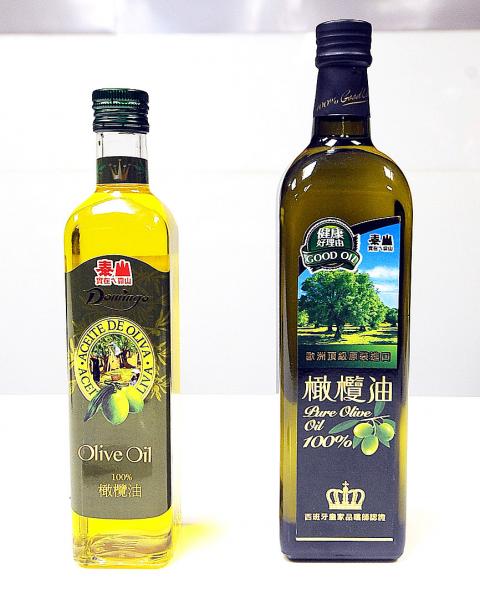The Ministry of Health and Welfare’s Food and Drug Administration (FDA) yesterday confirmed a media report that Spain had notified Taiwan as early as in 2009 about possible illicitly mixed oil products, but that officials did not take action at the time.
The Chinese-language Next Magazine edition published yesterday reported that the Spanish government notified Taiwan in 2009 and 2011 about some products manufactured by Taisun Enterprise Co (泰山企業) and Fwusow Industry (福壽油品) it suspected had been adulterated. The firms allegedly mixed imported olive pomace oil with other low-quality oil and sold the mix as pure olive oil.
The Spanish government listed two suspicious items, but the then-department of health ministers Yeh Chin-chuan (葉金川) and Yaung Chih-liang (楊志良) did not order an investigation into the products, the magazine said.

Photo: Fang Pin-chao, Taipei Times
FDA Director-General Yeh Ming-kung (葉明功) confirmed the report yesterday morning, adding that the agency had not been capable of carrying out tests at the time and could only ask importers to label their products appropriately.
He declined to elaborate.
Meanwhile, the two firms denied their extra-virgin olive oil products were adulterated and Taisun said it was considering taking legal action against the magazine.
The Greater Taichung Government’s health bureau said its inspection of Fwusow’s extra-virgin olive oil products found they conformed to standards and did not contain cottonseed oil.
However, at a FDA press conference yesterday afternoon, certain grapeseed oil products from Fwusow and Taisun were listed among 12 items found to contain copper chlorophyllin. The other products had been manufactured by Formosa Oilseed Processing Co (福懋油脂) and Ting Hsin International Group (頂新集團), both of which were previously found to have added inferior or banned substances and other oils to their oil products.
The 12 products will be removed from the shelves immediately for violating the Act Governing Food Sanitation (食品衛生管理法), FDA Northern Center for Regional Administration Director Feng Jun-lan (馮潤蘭) said.
In a bid to ease public concern, the agency published a list of 149 oil products that had been proven to be free of sodium copper chlorophyllin and copper chlorophyllin food colorants.
The list can be found on the FDA’s Web site (www.fda.gov.tw/TC/siteContent.aspx?sid=3719#1).
At a separate press conference, Democratic Progressive Party Legislator Chen Ting-fei (陳亭妃) said she would propose mandatory testing for imported oil to stop local manufacturers from mixing pure oil with low-quality varieties.
Local manufacturers would also be required to state the origin and repackaging location if their products had been reprocessed or repackaged.
Manufacturers are currently only required to provide the origin of the imported material on the labels, Chen said.
Taisun held a press conference yesterday evening to rebut the FDA’s announcement.
“We sent our grape seed oil to TUV Rheinland Aimex Ltd’s Taiwanese division for examination, and the result released on Oct. 28 confirmed that our oil does not contain copper chlorophyllin,” said Max Lei (雷松清), a special assistant to Taisun’s chairman.
Meanwhile, Fwusow said its grape seed oil was imported from Spain via Vidoria SL and it has not changed the oil’s content. Fwusow said it would sue Vidoria if the oil proves to be problematic.
Additional reporting by Camaron Kao and staff writer

The Ministry of the Interior (MOI) is to tighten rules for candidates running for public office, requiring them to declare that they do not hold a Chinese household registration or passport, and that they possess no other foreign citizenship. The requirement was set out in a draft amendment to the Enforcement Rules of the Public Officials Election and Recall Act (公職人員選舉罷免法 ) released by the ministry on Thursday. Under the proposal, candidates would need to make the declaration when submitting their registration forms, which would be published in the official election bulletin. The move follows the removal of several elected officials who were

The Republic of China (ROC) is celebrating its 114th Double Ten National Day today, featuring military parades and a variety of performances and speeches in front of the Presidential Office in Taipei. The Taiwan Taiko Association opened the celebrations with a 100-drummer performance, including young percussionists. As per tradition, an air force Mirage 2000 fighter jet flew over the Presidential Office as a part of the performance. The Honor Guards of the ROC and its marching band also heralded in a military parade. Students from Taichung's Shin Min High School then followed with a colorful performance using floral imagery to represent Taiwan's alternate name

FOUR DESIGNATED AREAS: Notices were issued for live-fire exercises in waters south and northwest of Penghu, northeast of Keelung and west of Kaohsiung, they said The military is planning three major annual exercises across the army, navy and air force this month, with the navy’s “Hai Chiang” (海強, “Sea Strong”) drills running from today through Thursday, the Ministry of National Defense said yesterday. The Hai Chiang exercise, which is to take place in waters surrounding Taiwan, would feature P-3C Orion maritime patrol aircraft and S-70C anti-submarine helicopters, the ministry said, adding that the drills aim to bolster the nation’s offshore defensive capabilities. China has intensified military and psychological pressure against Taiwan, repeatedly sending warplanes and vessels into areas near the nation’s air defense identification zone and across

A Chinese takeover of Taiwan would severely threaten the national security of the US, Japan, the Philippines and other nations, while global economic losses could reach US$10 trillion, National Security Council Deputy Secretary-General Lin Fei-fan (林飛帆) wrote in an article published yesterday in Foreign Affairs. “The future of Taiwan is not merely a regional concern; it is a test of whether the international order can withstand the pressure of authoritarian expansionism,” Lin wrote in the article titled “Taiwan’s Plan for Peace Through Strength — How Investments in Resilience Can Deter Beijing.” Chinese President Xi Jinping’s (習近平) intent to take Taiwan by force